“Hey kids, let’s put on a show!”
Or, how starting an amateur theatre group in a country and in a language not my own has been, well, illuminating. And also very cool.
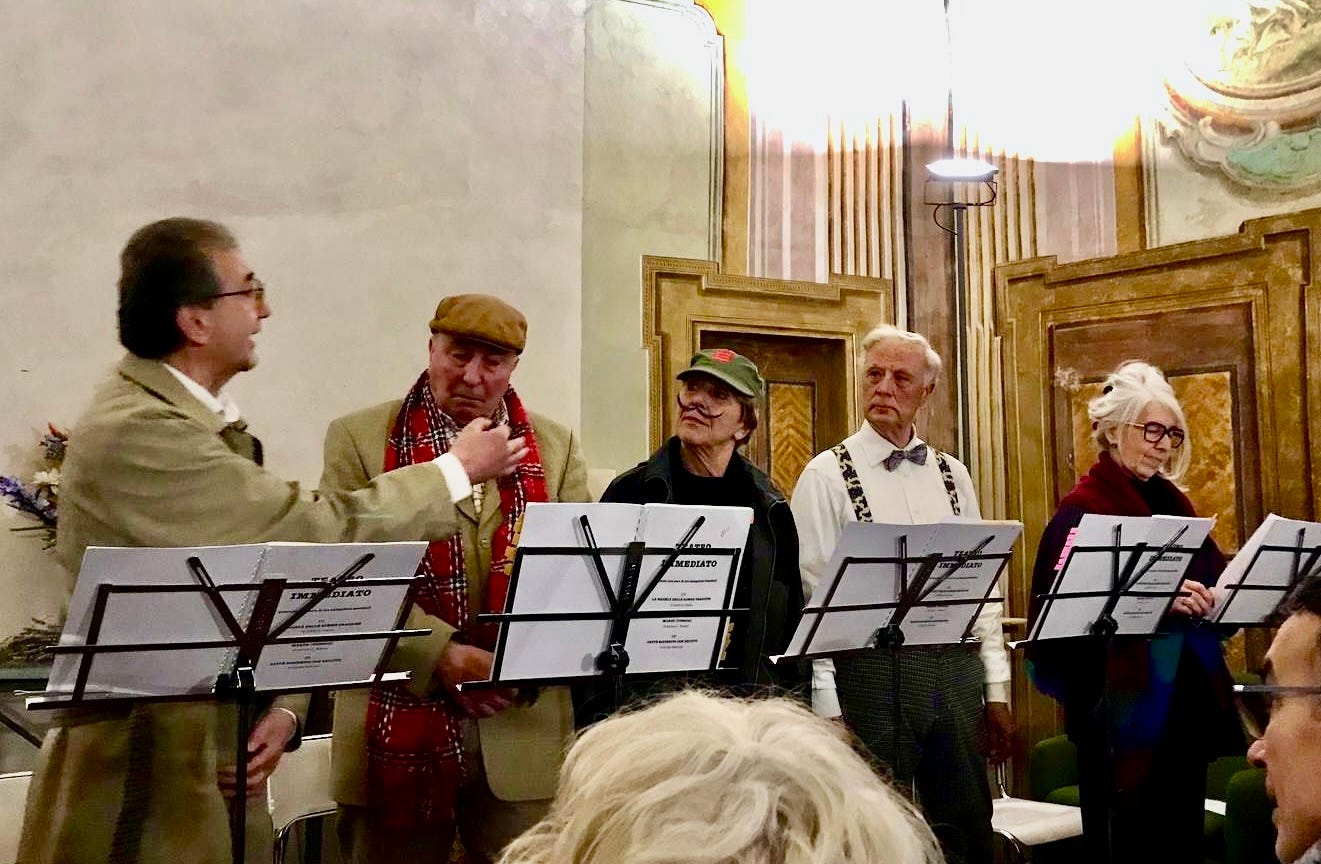
Cari amici,
No, really, I don’t expect y’all to go all Mickey Rooney and Judy Garland and put on a show for your Italian community like I did. There are easier ways to dig yourself into your neighborhood, like starting a book club, volunteering for cleanup efforts, curating an art show, even hosting an aperitivo. But I can tell you that starting a theatre troupe will be a lot of things, and a lot of those things are good. Let me explain.
I’ve written before (here and here) about community being an important factor in my decision to put down roots where I did. I chose a borgo with an active neighborhood association, and an apartment attached to a 12th-century church that’s home to a robust concert series. Though I envisioned participating in neighborhood events once I’d decided to buy my home, I never thought I’d create one of my own. Surprise! In this case, the active borgo was a real boon—I had the support of the neighborhood association president and the lecture series Cultura in Centro, which took Teatro Immediato under its wing, offering publicity and a performance space.
I’ve also written about missing the creative communities I’d been part of in the theatre and ballet worlds before I moved to Italy almost seven years ago. I missed being in rehearsals, the pre-show excitement, the evolution of a work of art that we all knew would morph into something with new dimensions when presented to an audience. And so when my playwright friend Richard suggested I should start a theatre group, I did. And I’ve cursed him colorfully and repeatedly for that suggestion, because man-oh-man, has it been challenging.
If I’d known exactly how challenging starting an amateur theatre troupe would be, it’s likely Teatro Immediato never would have existed. But now that we’re on the other side of the project’s two inaugural performances, I can say it’s been worth the struggle. Why? The obvious reason is that the performing arts bring a unique kind of joy to all who participate, on or off the stage. I had two goals, one personal and one a tad more generous: to regain the camaraderie particular to performing arts groups that I missed, and to bring something unique to my community. Both achieved, along with new friendships and a language learning experience like no other.
Teatro Immediato has as its mission the production of new, short plays; in this case, three very different works. The obstacles popped up right from the start. I wanted the group to be open to all, no experience or auditions needed, only the desire to test the theatrical waters (if that was the case) or return to them (if that was the case) and a commitment to the group. Ah, commitment. Apparently some people define that word differently than I do.
Fast-forward through months of rehearsals with ever-changing actors and three times the rehearsal time I’d intended and script revisions and format changes and postponed performance dates, and we arrive at mid-January, a month out from the performances, when the actors start to mesh, both with their characters and with one another. They’re becoming a troupe, becoming aware that acting isn’t just reading words from a script, that inhabiting another persona and presenting it convincingly takes fearlessness and flexibility and self-confidence and the ability to accept guidance and implement needed changes. It means thinking and feeling and being present (and speaking loudly and clearly) in ways they hadn’t understood when they signed up to tread the boards.
Dealing with myriad unforeseen moving parts was difficult enough. Then, when an actor dropped out very late in the game, I feared Teatro Immediato was dead. (See above: commitment.) But thanks to the adventurous spirit of one dedicated actor who had initially wanted to do only one role, we survived that loss. She took on a role that had terrified her at first, and she did it well. After more shuffling around of roles due to more unexpected complications, I finally began to believe Teatro Immediato was going to happen.
From the get-go, I had no idea what to expect. 1) Would the community be interested? 2) To accommodate the actors’ comfort zone, we’d switched from a semi-staged production to a staged reading, which, my Italian cast told me, isn’t widely done in Italy. Would audiences be disappointed by that? 3) Would anyone show up, or would the actors end up performing to a cluster of family and friends, their voices echoing in an otherwise empty space? 4) Would these fledglings do onstage what we’d so painstakingly—and at times painfully—managed to produce in terms of character, dynamics, rapport? 5) Would they do what we’d so painstakingly produced AND have fun?
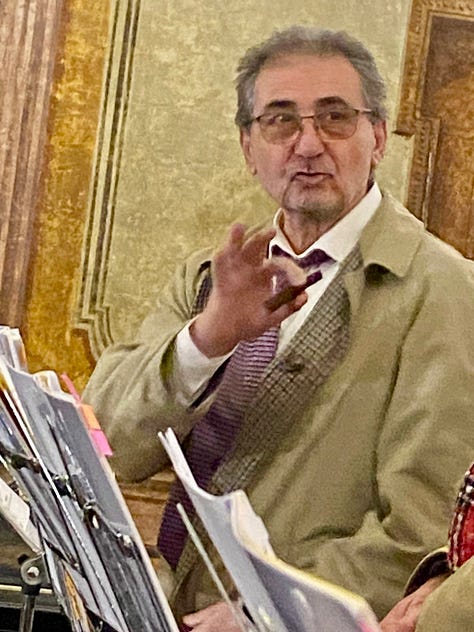
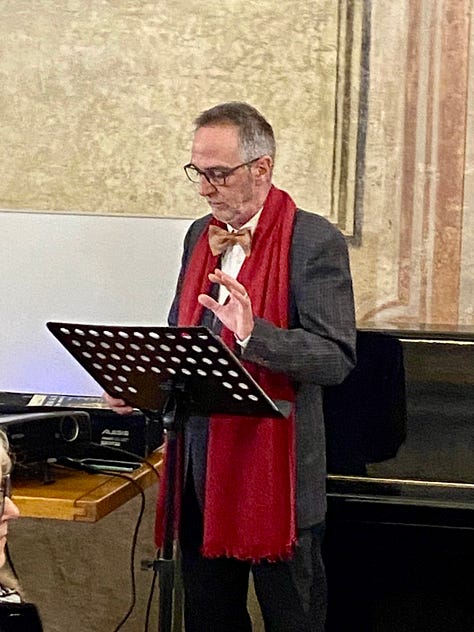
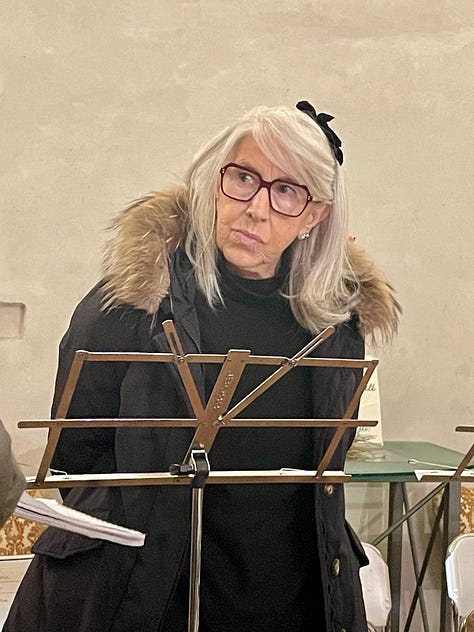
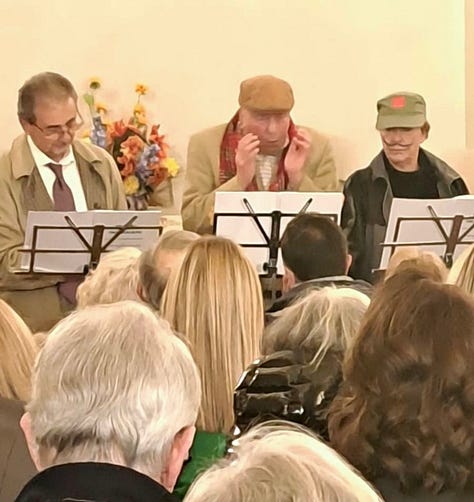

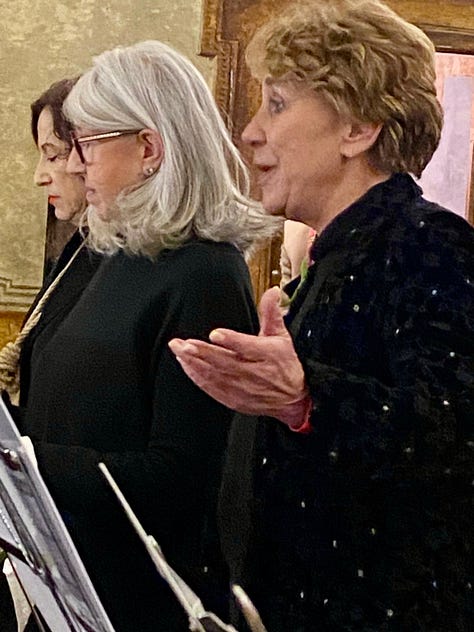
The answers to the questions above:
1) Yes, very; both the neighborhood association and Cultura in Centro were thrilled by the full houses and positive response. They’re open to future productions, and there’s talk of a repeat performance of this program in the lobby of the opera house, Teatro Morlacchi. And just the other day we were invited to present one of the plays at an event in March whose theme is battling violence against women.
As someone who will always be a straniera (foreigner) to my community, I’ve been lucky enough to feel welcome here—it helps that I’m the church courtyard’s unofficial gardener—but Teatro Immediato has allowed me to feel more ingrained into the broader community. Assimilation was always my goal as an immigrant. It’s a choice that anyone who lives in a country that’s not their own must make: whether to assimilate, and if so, how, and how much. It’s up to each of us to determine how involved we will be with our neighbors, our communities, and our cities.
2) Not a word of complaint! And some people who were unfamiliar with staged readings liked the format a lot.
3) No, the first show was SRO and the second well attended, if not quite a full house.
4) Yes. Not without some glitches, of course, but hey, they’re greenhorns and besides, it’s live theatre! Stuff happens.
5) Yes!
Did you notice that word rapport up there in number 4? It’s important, because the cast bonded not only as actors with one another and with me as their director, but as friends too, saying how happy they are to have met one another, how fun the experience has been. At least some of them are game for more. We had dinner together after the second show and another dinner is coming up, hosted by one of the actors. Through two of the cast members I met a writer who’s interested in trying his hand at a play for us, and we’re get together again to chat about writing and books and plays over coffee.
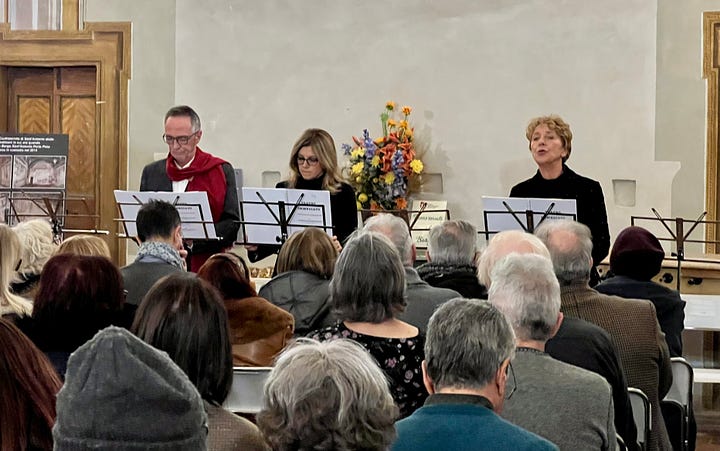
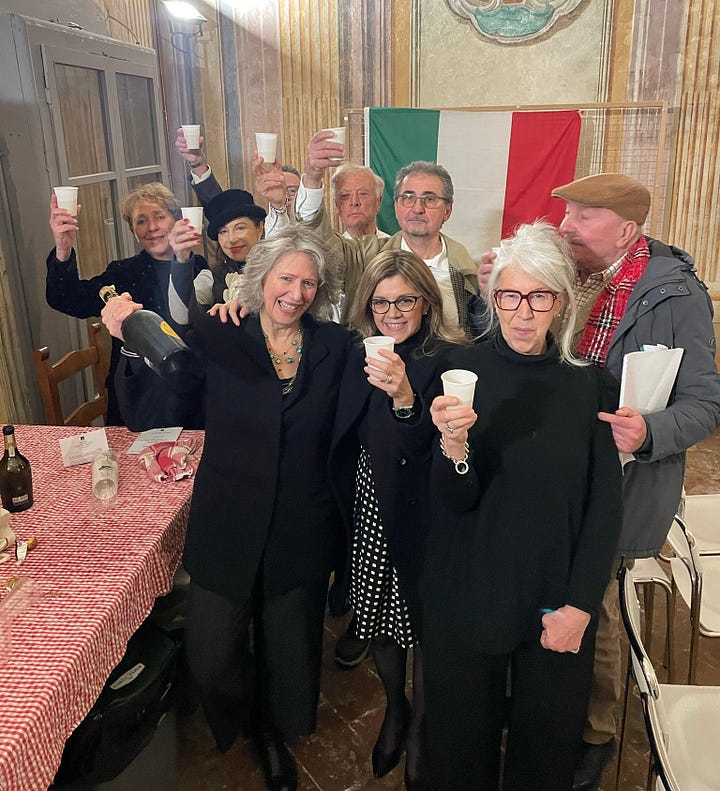
And what, you ask, about the language aspect of such a project? Boy-oh-boy, man-oh-man (yep, again), zowie, and mamma mia, did I learn a shit-ton. Translating two plays from English was the hardest thing I’ve done, language-learning-wise, and very humbling. No, I didn’t plug the English-language scripts into AI; translation is an art that requires a human brain, a human’s understanding of nuance and context and cultural differences, a human’s awareness of rhythm and meter and breath, a human’s ability to interpret someone else’s creative writing, their intent, their message, their specificity of character and place and narration. And yes, language.
So that was good. But when I say I learned a shit-ton, I also mean from my interactions with my little troupe of Italians from Sicily and Calabria and Umbria and Puglia and Le Marche. Sure, they fixed any awkward translations and delivered (grazie a Dio) real-life-spoken-Italian alternatives. But they also gave me hours and hours of experience in communicating specific, often nuanced, sometimes complex ideas. At which I often failed. Because along with grossly underestimating the amount of time and effort this project would take, I blithely considered myself capable of communicating what was needed.
Well.
Let’s just say there were many, many, many (did I mention many?) times when my vocabulary fell short (very short). There were times when someone, or quite a few someones, jumped in to try to help/explain, and I’m here to tell you that a barrage of chatter from a bunch of people all at once is most definitely not helpful. I thought giving line readings would bridge any gaps, which it did, sometimes, but not always. Halfway through the rehearsal period someone who’s fluent in both Italian and English joined the group, coming to my rescue when I got too stuck to dig myself out. So yes, I learned and learned and learned.
Insomma: for an intensive language-learning experience, put yourself in charge of a group, in an ongoing situation that challenges your grammar and vocabulary in unexpected ways, all while trying to work on artistic expression. Yeah, go do that.
Tante belle cose, alla prossima—
Cheryl
Italian words of the day
A selection of vocabulary from the three plays we did. While I learned a lot of words, I learned even more about Italian syntax and colloquial uses.
ancheggiare—to wiggle (in this case, move rhythmically to music)
bailamme—uproar
darsi una calmata—calm down
elemosina—almsgiving
frusciare—to rustle
fucile da caccia—shotgun, hunting rifle
inorridito—horrified, appalled
intessere—to weave (into)
movente—motive
nespole—medlar
ribelle—rebel, rebellious, renegade
ricamare—to embroider
salice—willow tree
scommetere—to bet
stantio—stale
sventura—misfortune, doom
titubanza—hesitation, wavering
vagare—to wander
zotico—boor, oaf
Italian films of the day
Noi and la Giulia (2015), a delightful comedy with some of my favorite actors, including a young Luca Argentero as a loveable, bumbling nerd and Claudio Amendola as a fearless Communist.
Parthenope (2025) is an art film about the destructive aspects of beauty. It’s slow, very strange, with lots of nudity. I’m not running around telling people to see it, but it sure is interesting.
P.S. My book! Which you can buy here or on the usual sites, or, better yet, order it from your local bookstore. Another fab option is to ask your library to stock it. If you read it and like it, please tell your friends and/or leave a few lines of praise on any bookish site. You’d be surprised how much a rating or review helps authors. Baci!





Teatro Immediato, I'm so impressed by this! Brava!!!
I think this has all the makings of a delightful little film 💜💜
I give you full credit for translating from English into Italian. I'm confident translating from French into English, but very insecure about the reverse. Brava!